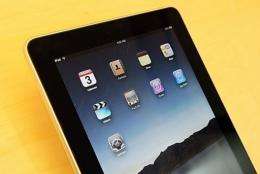Asia computer market has room for both tablets and laptops

Tablet computers such as Apple's iPad and Samsung's Galaxy have had a fanfare of publicity, but they are unlikely to kill off their older cousin the laptop anytime soon, say Asian analysts and vendors.
Sales of smaller-screen and cheaper netbook laptops may appear to be sloping off in a mature market like the United States, but analysts in Asia believe this is not the end of the road for the laptop itself.
"The tablet is a secondary device, meant for people who already have a PC and want a device for portable usage," said Tracy Tsai, a Taipei-based analyst with technology research company Gartner.
"Using the tablet as your only device is rare, as you still need something with a keyboard to type in things, and storage."
Apple's iPad has replaced half of US electronics chain store Best Buy's cheaper netbook sales, the retailer estimated last month, and the pressure can only increase as a stream of gadget makers bring out their own tablets.
Best Buy has begun showcasing e-readers, tablets and mobile devices in its most prominent store displays as Christmas approaches.
"People are willing to disproportionately spend for these devices because they are becoming so important to their lives," Best Buy Chief Executive Brian Dunn told the Wall Street Journal.
In Taiwan, a Nielsen Global Consumer survey in March found that 36 percent of people either had a tablet computer already or planned to buy one.
"iPads have faster Internet connections than laptops," said a vendor in downtown Taipei surnamed Wen. "It's lighter and easy to carry around so many people are buying it now."
But Taipei is not typical of Asia's billions of consumers, however, and there will initially be relatively limited markets for the iPad and competing tablets made by several manufacturers including Samsung and Dell.
"In emerging markets users in places like Shanghai or Beijing have a purchasing power similar to the average person in Singapore and Taipei, but it's still limited to first-tier cities," said Gartner's Tsai.
"Most emerging markets are price-sensitive, and in Indonesia for example a price difference of 20 or 30 dollars is important."
Japan is definitely alert to the advantages of moderately-sized tablet computers in cramped spaces, but observers are careful not to pronounce the laptop dead, or even ailing, just yet.
"A tablet computer is an item you can literally walk around with in one hand," said Takumi Sado, a senior analyst at Daiwa Securities Capital Markets.
"You can carry a notebook computer around, too, but you still need to find a place to sit down and work on it.
"But if you want to type up something, a notebook computer still works better... At this point, I can only say that tablet PCs are for different needs, such as online search, from those of laptop computers."
Japanese electronics giant NEC, the dominant player in the domestic computer market, sold 2.73 million PCs last year, 60 percent of which were laptops, a company spokesman said.
"Basically in Japan, a notebook computer has become an essential item in a regular household. We are considering a tablet PC as an item somewhere between a notebook and a mobile phone," he said.
"We think the tablet computers will create a whole new market on top of notebook PCs. We don't think the tablet would diminish the market of laptop computers."
Toshiba, another Japanese electronics giant, has marketed a mobile PC model without a keyboard, called the libretto, which opens up like a book with two slate displays on both sides.
The company said it has also developed a slate-type tablet computer called Folio 100, planning to release it next year only in Europe, Africa, Middle East and part of Asia including Southeast Asian nations, but not in Japan.
"The company believes tablet computers are a new category of products," a Toshiba spokeswoman said.
New technologies can be disruptive, even destructive. But they can also be the opposite, giving new momentum to existing, more mature technologies.
"Tablet PCs and laptops have different functions and are expected to create a different segment of consumers and will complement each other," said James Song, a Seoul-based analyst for Daewoo Securities.
"So tablets will enhance the overall usage of mobile PCs."
(c) 2010 AFP




















